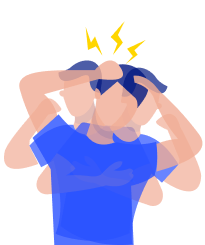

Mal de Débarquement Syndrome (MdDS) is a rare disorder that usually develops after travel, especially by sea. It can also occur after long auto or air travel, although this is less common. MdDS is more prevalent in women than men and can significantly impact daily life. Some individuals may develop MdDS without a history of prolonged motion exposure. The intensity of this false sense of motion varies among individuals. Symptoms typically decrease during passive motion, such as in a moving car or airplane, and often disappear completely while driving. Unfortunately, MdDS is often undiagnosed or misdiagnosed and may persist for years without proper treatment.



Common symptoms of Mal de Débarquement include:
Anxiety and depression may accompany these symptoms, but true spinning vertigo is rare. Symptoms tend to intensify in closed spaces or when trying to remain still, such as sitting on a couch or lying down in bed. Stress can exacerbate the symptoms in some individuals. However, continuous movement, such as driving a vehicle, often improves or eliminates the symptoms.


To diagnose Mal de Débarquement, a patient must report a history of returning to a normal environment followed by the onset of rocking, swaying, or disequilibrium sensations. Objective diagnostic procedures, such as a full Vertigo Profile Test, should be performed to rule out other causes of the symptoms.

Standard treatments for motion sickness, including meclizine and scopolamine patches, are often ineffective for MdDS. However, several treatments have shown promising results:
By identifying and treating MdDS appropriately, patients can significantly improve their quality of life and reduce the distressing symptoms associated with this condition.
MdDS stands for Mal de Debarquement Syndrome. It is a rare neurological balance disorder that creates a persistent rocking, swaying, or bobbing sensation, often after exposure to passive motion like boats, flights, or long car rides. Symptoms typically ease during movement and return at rest. It is linked to how the brain adapts to motion, not the ears themselves.
MdDS is caused by maladaptation in the brain’s vestibulo-ocular and postural networks after prolonged passive motion. Instead of resetting once motion stops, the brain remains in “motion-compensation mode,” creating ongoing perceived movement. Triggers commonly include sea travel, air travel, or immersive motion environments. Hormonal influences, migraine history, and neural connectivity patterns may increase susceptibility.
No. MdDS is not a mental illness. It is a neurological condition involving abnormal sensory processing and vestibular network adaptation in the brain. While the symptoms can cause secondary anxiety or stress due to chronic imbalance sensations, the disorder itself is not psychological in origin. It affects neural motion pathways, not cognition or behavior.
Yes, walking can help manage MdDS symptoms for many people. Since the brain temporarily stabilizes balance signals during active motion, gentle walking often reduces the swaying sensation in the moment. Regular light movement supports sensory recalibration and stress reduction, though it is not a cure. Overexertion or sudden head turns should still be avoided if they provoke symptoms.
The quickest path depends on the cause. For positional vertigo, canalith repositioning maneuvers often give rapid relief. For nerve-sensitivity vertigo and recurring attacks, clinical testing helps pinpoint the exact trigger. Neuroequillibrium provides specialized vestibular assessment to identify motion-trigger patterns accurately, which is essential for choosing the most effective and safest treatment approach for fast recovery.
Corporate Office:
140, Shrigopal Nagar, Gopalpura Bypass Road, Jaipur 302018, Rajasthan, India
Manufacturing Site:
1st Floor, Plot No.3, Pooja Tower, Muktanand Nagar, Gopal pura Mode, Jaipur, Rajasthan 302018
All rights reserved © 2026 NeuroEquilibrium Diagnostic Systems Pvt Ltd.
Vertigo Clinic in Ujjain | Vertigo Clinic in Barwani | Vertigo Clinic in Patna | Vertigo Clinic in Miraj | Vertigo Clinic in Kolhapur | Vertigo Clinic in Nashik | Vertigo Clinic in Jaysingpur | Vertigo Clinic in Amravati | Vertigo Clinic in Solapur | Vertigo Clinic in Pune | Vertigo Clinic in Aurangabad | Vertigo Clinic in Nagpur | Vertigo Clinic in Sagar | Vertigo Clinic in Indore | Vertigo Clinic in Jabalpur | Vertigo Clinic in Bhopal | Vertigo Clinic in Bilaspur | Vertigo Clinic in Ahmedabad | Vertigo Clinic in Vadodara | Vertigo Clinic in Surat | Vertigo Clinic in Navi Mumbai | Vertigo Clinic in Thane | Vertigo Clinic in Mumbai | Vertigo Clinic in Palghar | Vertigo Clinic in Jaipur | Vertigo Clinic in Sriganganagar | Vertigo Clinic in Alwar | Vertigo Clinic in Kota | Vertigo Clinic in Udaipur | Vertigo Clinic in Lucknow | Vertigo Clinic in Prayagraj | Vertigo Clinic in Varanasi | Vertigo Clinic in Gurgaon | Vertigo Clinic in Dehradun | Vertigo Clinic in Rohtak | Vertigo Clinic in Amritsar | Vertigo Clinic in Ludhiana | Vertigo Clinic in Greater Noida | Vertigo Clinic in Delhi | Vertigo Clinic in Kannur | Vertigo Clinic in Trichur | Vertigo Clinic in Cochin | Vertigo Clinic in Coimbatore | Vertigo Clinic in Tiruppur | Vertigo Clinic in Chennai | Vertigo Clinic in Hosur | Vertigo Clinic in Bangalore | Vertigo Clinic in Mangalore | Vertigo Clinic in Hyderabad | Vertigo Clinic in Sangli